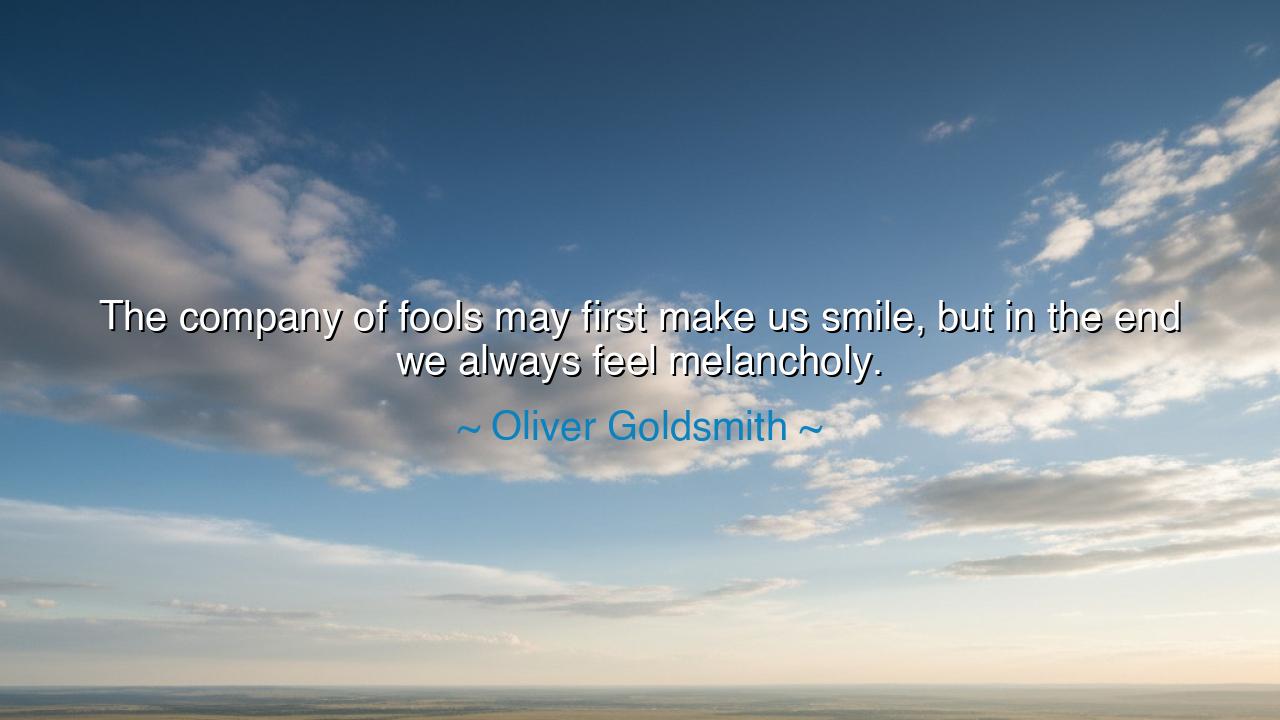
The company of fools may first make us smile, but in the end we
The company of fools may first make us smile, but in the end we always feel melancholy.






The words of Oliver Goldsmith—“The company of fools may first make us smile, but in the end we always feel melancholy.”—are a caution written in the language of timeless wisdom. At first, they remind us of the fleeting sweetness of shallow amusement, the kind of laughter that rises easily but fades quickly, leaving the soul hollow. For the smile born of folly is like the froth upon the sea: bright for a moment, but without depth, without nourishment, vanishing as soon as it appears. Goldsmith, who lived among the salons and taverns of eighteenth-century London, knew well the emptiness of such company, and his words stand as a warning for all generations.
The ancients themselves spoke often of this truth. They taught that the soul is shaped by the company it keeps. Fools may entertain, but they cannot elevate. Their jests may stir laughter, but in time the heart grows weary, for no seed of wisdom is planted in such soil. The wise man leaves the gathering of fools with a heaviness of spirit, for he knows he has spent his time on dust rather than gold. In this lies the melancholy of which Goldsmith speaks: the sorrow that follows wasted hours, the ache of knowing one’s spirit has been diminished rather than enriched.
Consider the story of the Roman philosopher Seneca, who once warned against attending the gladiatorial games too often. He confessed that though he went at first to observe with detachment, he left each time feeling degraded, infected by the bloodlust and madness of the crowd. What seemed like harmless amusement at first brought only bitterness of spirit in the end. The lesson is the same: the company of those who delight in folly, cruelty, or emptiness may give us a moment’s grin, but when we depart, our hearts are heavier, not lighter.
Goldsmith himself lived with a restless spirit, often drawn into circles of gaiety that left him in debt and despair. Though known for his wit, his writings reveal a longing for deeper meaning, for truth and virtue rather than hollow laughter. His own melancholy after frivolous indulgence gave birth to such a reflection. He had seen the difference between merriment that ennobles and folly that corrodes, and he wished his readers to know it too.
This teaching is not a rejection of joy, but a reminder that true joy and shallow amusement are not the same. Joy strengthens; it lingers in the heart like good wine, warming and uplifting. Folly, on the other hand, intoxicates for a moment but leaves the spirit thirsty and unfulfilled. We are called, then, to discern between laughter that lifts and laughter that drags down, between companions who inspire us to rise higher and those who chain us to emptiness.
The lesson for us is clear: seek the company of those whose presence leaves you richer, whose words stir thought, whose laughter is free from malice and whose joy does not fade into regret. Do not despise amusement, but guard against letting it become your diet. For as the body weakens when fed only sweets, so too does the soul weaken when fed only folly. Choose companions as carefully as you would choose food for the body, for both nourish life.
Practically, this means pausing to reflect after gatherings: ask yourself, “Do I leave lighter or heavier in spirit? Do I feel inspired, or emptied?” If the answer is the latter, then perhaps you have kept the company of fools. Limit such time, and instead seek out wise friends, books of substance, or quiet solitude, where the soul can grow. Remember that life is short, and hours wasted in folly cannot be reclaimed.
Thus, Oliver Goldsmith speaks to us across centuries, offering not a dry rule but a lived truth: beware the fleeting smile of folly, for it conceals a seed of melancholy. Instead, anchor your joy in wisdom, in virtue, and in worthy companions. In this way, your laughter will not fade into sorrow but will echo with the strength of a soul well-nourished and a life well-lived.






AAdministratorAdministrator
Welcome, honored guests. Please leave a comment, we will respond soon